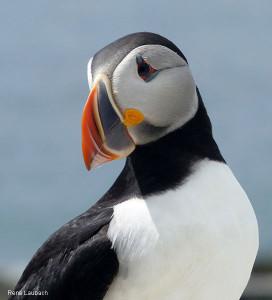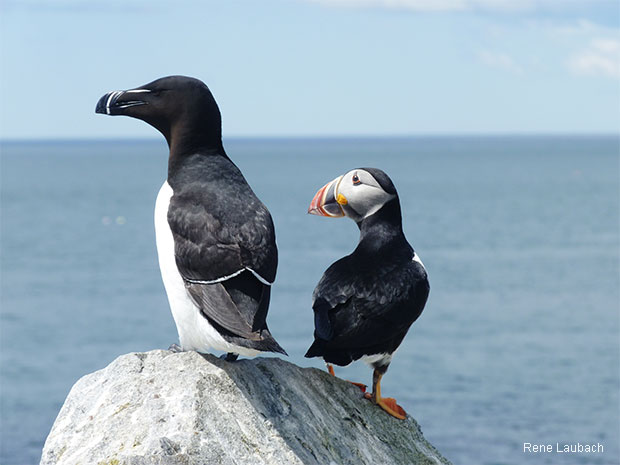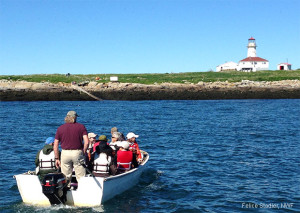We have much more to do and your continued support is needed now more than ever.
Puffins Faring Well…For Now

With a group of 10, we traveled 45 nautical miles off the coast of Maine to Machias Seal Island, a designated bird sanctuary and home to the largest colony of Atlantic puffin that U.S. travelers can easily view off the Maine coast. Cutler, Maine (population 507), the launch point for our trip to Machias Seal Island, is over 230 miles north of Portland.
They are protected under the Migratory Bird Treaty Act, so restrictions regarding contact with the puffins are tight to ensure their population continues to grow. Only 30 people/day are allowed to dock on the island (weather permitting), with trips to the island running between the months of May-August.
Our guests traveled from across the country to witness a bird that is rare in the U.S., and which takes considerable effort to see close up in the wild.
Hanging in a Delicate Balance
Today, Atlantic puffin off the Maine Downeast coast are hanging in a delicate balance. While major recovery efforts have brought back native populations to higher numbers (from about 100 in 1973 to over 1,000 today), they are living on the front lines of a changing climate. If we don’t reign in our climate-harming behaviors, these beautiful puffins face a troubling future.

We learned that puffins only live in cold waters, explaining why the majority of birds along the Atlantic seaboard only migrate to and nest in the northern tip of coastal Maine in the Bay of Fundy. And we learned that a warming climate can affect the nesting and feeding needs of puffins:
- Nesting is harmed by extreme storms and the rising seas, which are expected to worsen as the global temperature of our earth continues to rise.
- Puffins depend on small fish that live in cold oceans, so when ocean temperatures rise, other, larger fish move in that puffin fledglings are not able to eat.

Puffins are Worthy of Protection
Atlantic puffins are being watched closely, as they are our canary in the North Atlantic. Ecological changes are creating ripple effects that likely will make it impossible for wildlife species like the puffin to readily adapt to a warming climate.
The Atlantic puffin is a national treasure that’s worthy of protection. I hope you will join me and tens of thousands of other wildlife advocates in efforts to turn the tide on climate change. Let us hope we never witness the day when the only glimpse one is able to catch of the Atlantic Puffin in Maine is on a t-shirt.
![]() Take action for puffins at risk from climate change. Speak out against attacks to the Environmental Protection Agency’s historic proposed limits on carbon pollution!
Take action for puffins at risk from climate change. Speak out against attacks to the Environmental Protection Agency’s historic proposed limits on carbon pollution!
Please also consider making a donation supporting NWF’s work to protect the Atlantic puffin and other wildlife species threatened by climate change.





















